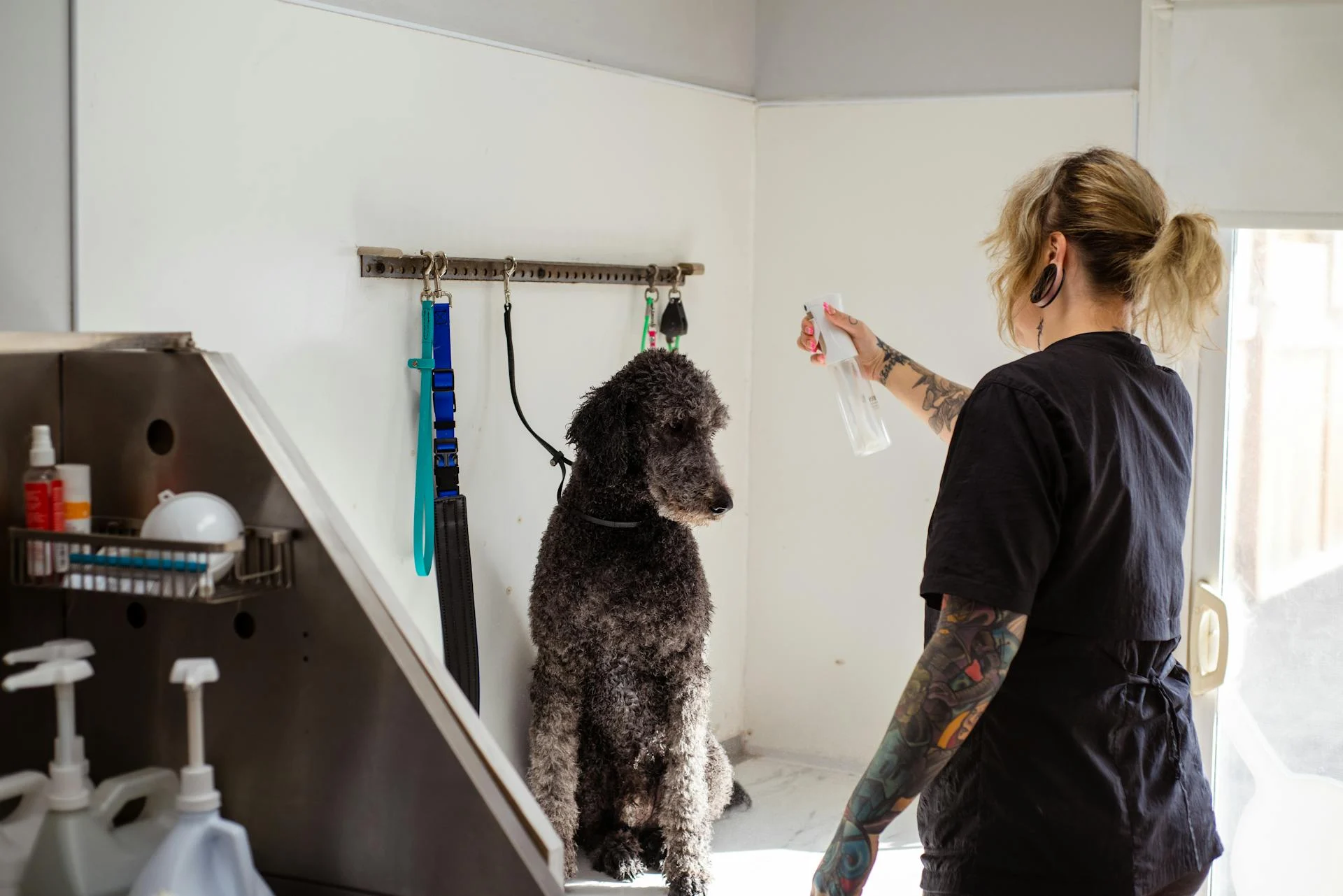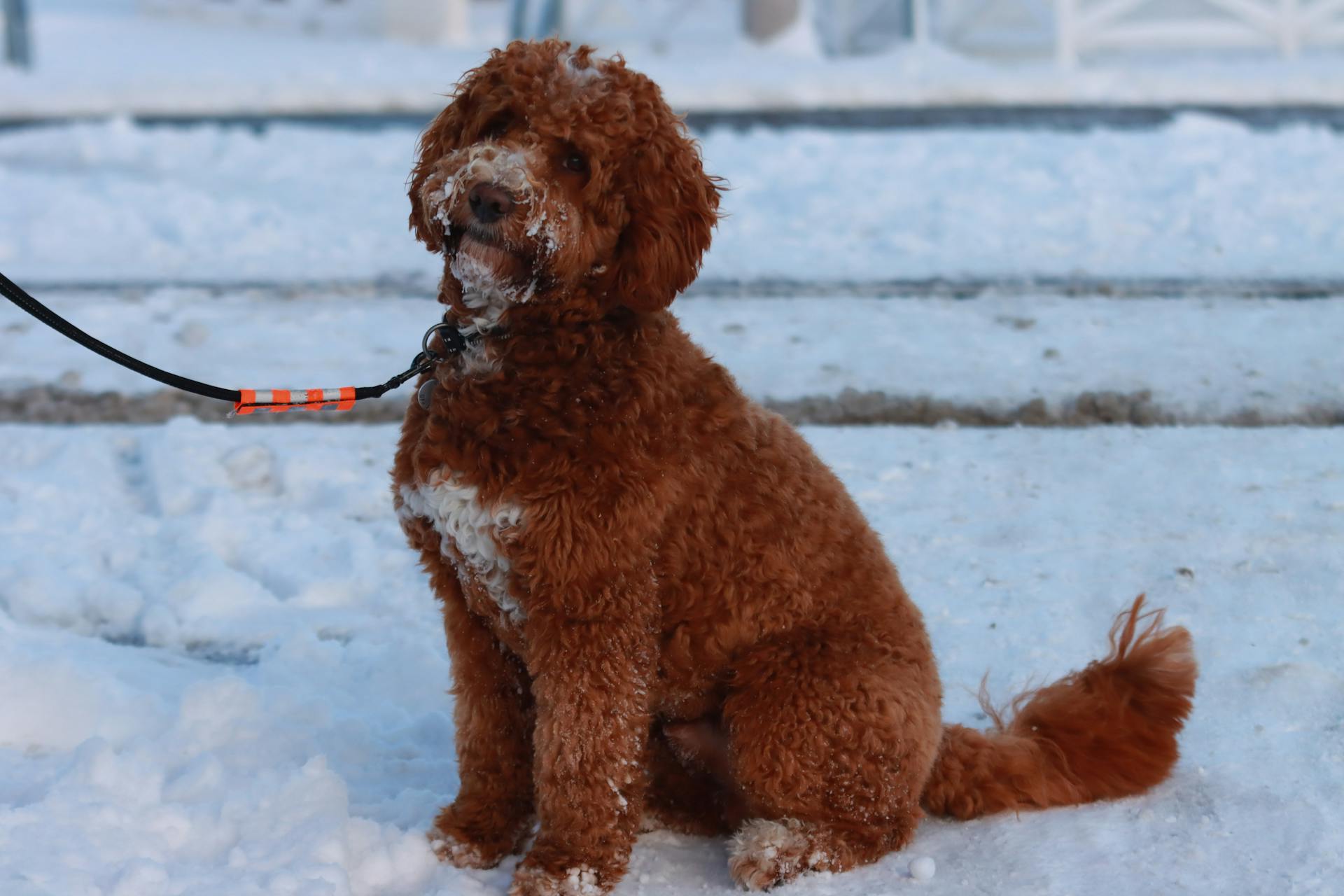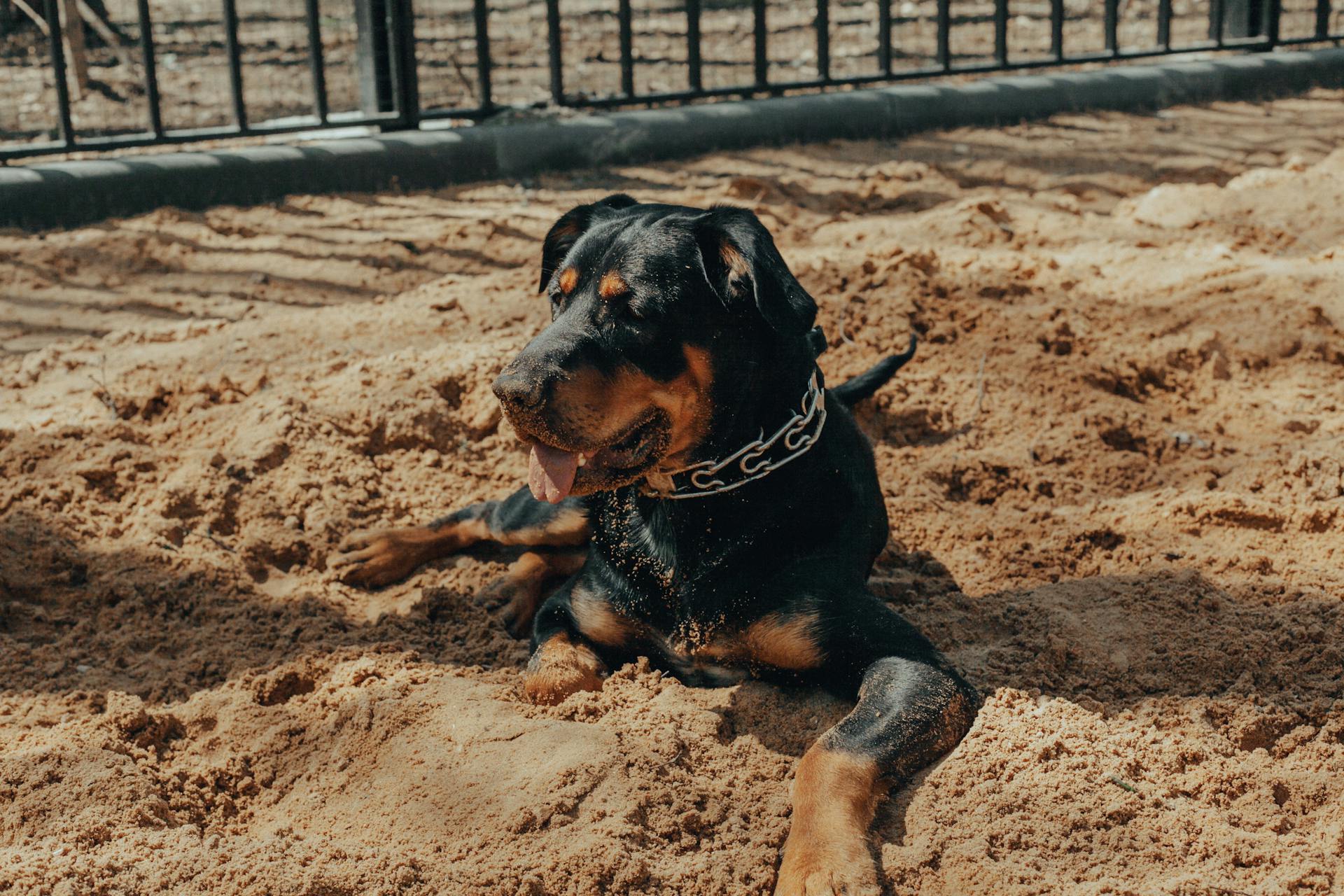
Standard Poodles are highly intelligent dogs, known to be one of the smartest breeds around.
They excel in obedience training and are often used as performance dogs in dog sports. With proper training, they can learn hundreds of commands and tasks.
Poodles are naturally athletic and agile, making them well-suited for activities like agility and obedience training. They're also relatively low-shedding, which makes them a great choice for people with allergies.
Standard Poodles typically weigh between 40-70 pounds and stand between 15-20 inches tall at the shoulder.
Additional reading: Training a Standard Poodle
Health
Standard poodles are prone to certain health issues, and being aware of these can help you provide the best possible care for your furry friend. One of the most common health concerns is periodontal disease, which can be prevented by brushing your dog's teeth daily.
Regular brushing and grooming are essential to keep your standard poodle's coat beautiful. They also need consistent training and mental stimulation to stay happy and healthy. A high-quality diet and regular exercise, such as swimming, are also crucial for their overall well-being.
Here's an interesting read: Embark Breed & Health Dog Dna Test Stores
Standard poodles are more at risk for certain genetic conditions, including gastric dilatation-volvulus, a potentially life-threatening disorder, and hip dysplasia, which can cause arthritis. They also need to be screened for eyelid or retinal problems, and owners should be aware of the signs of patellar luxation, a dislocation of the kneecap.
Some common signs of health issues in standard poodles include changes in appetite or water consumption, tartar build-up, bad breath, red gums, or broken teeth, and itchy skin or hair loss. If you notice any of these symptoms, it's essential to seek veterinary help promptly.
Here are some common health issues to watch out for in standard poodles:
- Change in appetite or water consumption
- Tartar build-up, bad breath, red gums, or broken teeth
- Itchy skin (scratching, chewing, or licking), hair loss
- Lethargy, mental dullness, or excessive sleeping
- Fearfulness, aggression, or other behavioral changes
- Dull coat, hair loss, sluggish, weight gain
- Lumps or bumps – regardless of size
Grooming and Maintenance
Grooming a standard poodle requires regular attention to keep their unique coat looking its best. They need to be brushed daily to prevent matting, and their hair should be trimmed every three to six weeks to maintain a healthy coat.
Worth a look: Dogs Breeds That Start with B
Brushing your poodle's teeth is also essential, as standard poodles often have serious problems with their teeth. You should brush their teeth at least three times a week, and daily is even better.
In addition to brushing, regular nail trims, baths, and ear cleanings are also necessary. You should check your poodle's ears weekly to ensure they don't have any dirt, redness, or bad odor that can indicate an infection.
Here are some grooming tasks to consider:
- Brush your poodle's teeth at least three times a week
- Check your poodle's ears weekly for dirt, redness, or bad odor
- Nail trims and baths every 4-6 weeks
- Daily brushing to prevent matting
Hairstyles
The Poodle's unique coat requires regular grooming to prevent matting and tangling.
Poodles come in a variety of colors, including blue, black, white, gray, silver, brown, café-au-lait, apricot, and cream.
Grooming a Poodle isn't for the faint of heart, as they require regular grooming every three to six weeks, sometimes more often.
You can style your Poodle's coat in many ways, but if you're going to compete in the show ring, you'll need to stick to one of the four specific clip styles allowed by the American Kennel Club.
See what others are reading: How to Groom Standard Poodle
Even when clipped short, your Poodle needs daily brushing to prevent matting and tangling.
Many owners choose to shave their Poodle's coat for easier care, but this still requires regular grooming to keep the coat clean and short.
Poodles are prone to weepy eyes, which can stain the hair under their eyes, especially if they have a lighter coat.
You can prevent tearstains by wiping around your Poodle's eyes and face every day with an alcohol-free pet wipe or washcloth.
Regular ear cleaning is also essential, as Poodles are prone to ear infections due to their ear canal's dark and moist environment.
You can brush your Poodle at least two to three times per week, or daily if you prefer, to prevent matting and tangling.
Baths and nail trims will be required about every four to six weeks, and you should also check your dog's ears at least weekly.
Daily brushing of your Poodle's teeth is also a must to prevent dental problems.
If this caught your attention, see: All Hypoallergenic Dog Breeds
Grooming
Grooming is a crucial part of Poodle care, and it's essential to understand what's involved. Poodles are a non-shedding breed, which means their curly, wiry coat requires regular grooming to prevent matting and tangling.
Brushing is a must, as Poodles don't shed like other breeds. You'll need to brush your Poodle at least two to three times a week, and some owners do it daily. This will prevent painful matting and keep their coat looking its best.
Baths and nail trims are also necessary, typically every four to six weeks. You'll also need to check your Poodle's ears weekly for dirt, redness, or a bad odor that can indicate an infection. To prevent tear staining, wipe around your Poodle's eyes and face daily with an alcohol-free pet wipe or washcloth dampened with warm water.
Daily brushing is crucial, even when your Poodle is clipped short. You'll need to brush your Poodle's teeth every day, and regular grooming sessions will help prevent ear infections and keep their coat in top condition.
For your interest: Facts about Toy Poodles
Here's a rough guide to Poodle grooming frequency:
- Brushing: 2-3 times a week (or daily)
- Baths: every 4-6 weeks
- Nail trims: every 4-6 weeks
- Ear checks: weekly
- Brushing teeth: daily
Remember, grooming is a regular part of Poodle care, and it's essential to make it a routine. With the right tools and a little practice, you'll be able to keep your Poodle looking and feeling its best.
Lifestyle and Activity
Standard poodles need plenty of exercise to stay happy and healthy. They're natural athletes and excel at dog sports like obedience, agility, and hunting.
To keep your standard poodle active, you can try swimming, which is a great form of exercise for them. They love the water and it's a great way to get some exercise while having fun.
Here are some exercise options for your standard poodle:
- Jogging
- Long walks
- Swimming
- Fetch
It's also essential to keep your poodle's mind active, as they can get bored if they don't have enough mental stimulation. Regular training and playtime can help prevent naughty behavior.
They Come in Three Sizes
The Poodle breed comes in three main sizes: tiny Toy Poodle, mid-sized Miniature Poodle, and large Standard Poodle.
All three sizes are expected to comply with the same breed standard, which is a great thing for dog enthusiasts who want consistency in their furry friends.
The Toy Poodle stands up to 10 inches tall and weighs about six to nine pounds, making it a great companion for apartment dwellers or those with limited space.
The Miniature Poodle stands 11 to 15 inches tall and weighs 15 to 17 pounds, which is just the right size for many families with smaller children.
The Standard Poodle stands 15 inches and taller (usually 22 inches), with males weighing 45 to 70 pounds and females weighing 45 to 60 pounds, making it a great choice for active families or individuals.
You might like: 15 Breeds of Dogs
Care and Lifestyle
Poodles are highly active dogs that require regular exercise and mental stimulation to stay happy and healthy. They need at least 30 minutes of exercise per day, which can include activities like jogging, long walks, and swimming.
Here's an interesting read: Standard Poodle Exercise Needs

To keep your Poodle's coat beautiful, regular brushing and grooming are essential. This should be done at least 3 times a week, with a focus on preventing matting and tangling.
Poodles are intelligent dogs that thrive on mental challenges, so it's essential to provide them with activities that stimulate their minds. This can include obedience training, agility exercises, and even dog sports like hunting and retrieving.
To ensure your Poodle's diet is consistent and healthy, feed a high-quality food that's appropriate for their age. Avoid giving them people food, as this can lead to digestive issues and other health problems.
Here's a breakdown of the daily care routine for a Poodle:
- Brush teeth at least 3 times a week to prevent serious problems
- Clean ears weekly to prevent infections
- Brush coat daily to prevent matting and tangling
- Provide regular exercise and mental stimulation
- Feed a high-quality diet that's appropriate for their age
Poodles are versatile dogs that can thrive in a variety of living situations, from apartments to homes with yards. However, they do require regular exercise and mental stimulation to stay happy and healthy.
Temperament and Personality
Standard Poodles are known for their intelligence and trainability, making them a popular choice as circus performers and obedience trial competitors. They're also used as service dogs.
Their energetic nature means they need plenty of exercise and mental stimulation to prevent boredom and destructive behavior. A daily walk and playtime are a must.
Poodles are generally friendly and outgoing, getting along well with kids and other pets if socialized properly. However, some may take time to warm up to new people.
Their high intelligence can be both a blessing and a curse, as they learn quickly - good and bad habits alike. Regular training and positive reinforcement are a must to keep them on track.
Here are some key personality traits of the Standard Poodle:
Overall, Standard Poodles make wonderful companions for active families or individuals who can provide the necessary exercise and attention.
History and Origins
The standard poodle is one of the oldest breeds, with a history dating back thousands of years.
Historians agree that the poodle originated in Germany, but developed into its own distinct breed in France.
The poodle's ancestry is shrouded in mystery, but it's believed to have resulted from crosses between European water dogs, including Spanish, Portuguese, French, German, Hungarian, and Russian water dogs.
The breed's name comes from the German word for puddle, reflecting its origins as a water retriever.
The standard poodle was used for duck hunting, and its intelligence and ability to swim made it a loving and loyal pet.
The poodle's distinctive coat protected it against the elements, and the hunters gave the poodles their trademark haircut, shaving parts of their body for better range of motion.
In the 1400s, breeders began producing smaller versions of the poodle, creating the miniature and toy varieties.
The French used the larger standard poodle for duck hunting and the mid-sized miniature poodle to sniff out truffles in the woods.
The tiny toy poodle's main job was to serve as a companion to the nobility and wealthy merchant class, earning the nickname "sleeve dogs."
Check this out: English Hunting Cocker Spaniel
Frequently Asked Questions
What are fun facts about Poodles?
Poodles are highly intelligent and versatile dogs, exceling as service dogs, guide dogs, and therapy dogs due to their keen senses and eagerness to please. Their unique abilities also make them well-suited for specialized roles like truffle hunting.
What makes Poodles happy?
Poodles are happiest when they're active, whether that's swimming, playing, or going on long walks with their family. They thrive on interaction and exercise, making them a great fit for families who can keep up with their energetic needs.
Sources
Featured Images: pexels.com


